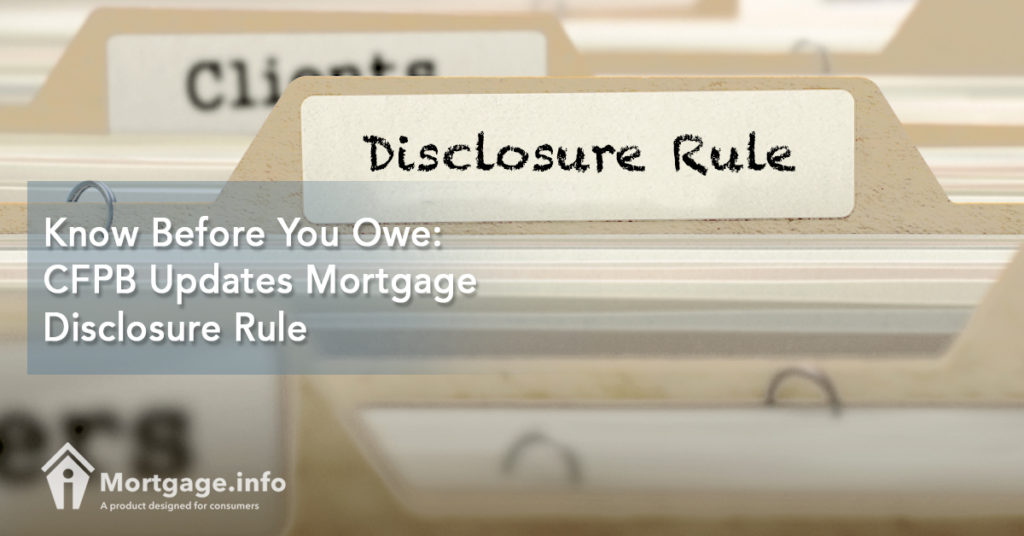The Consumer Financial Protection Bureau has made known changes to its “Know Before You Owe” rule that requires lenders to provide important disclosures to consumers about their mortgages. The changes finalized by the CFPB on housing assistance lending, housing cooperatives, and so on aim to provide more certainty and clarity regarding the mortgage disclosure rule.
Creation of and Changes to Know Before You Owe
“A mortgage is one of the largest financial decisions a consumer will ever make, and CFPB’s rules help ensure consumers have the easy-to-understand information they need before making a decision that will significantly impact their financial lives,” said Richard Cordray who serves as director of the Bureau in an accompanying public statement.
Back in October 2015, the Know Before You Owe rule came into effect. The Bureau previously combined the Truth in Lending Act (TILA) and the Real Estate Settlement Procedures Act (RESPA) to come up with a final rule that integrates existing rules as well as new ones created under the Dodd-Frank Act to aid consumers in the mortgage process and help them make informed choices.
The final rule, also known as the TILA-RESPA Integrated Disclosure (TRID) rule, primarily gave birth to the Loan Estimate, which sets forth clearer information about the loan’s terms, estimates and closing costs for easier comparison shopping.
Two years and several concerns by industry stakeholders regarding the mortgage disclosure initiative later, the CFPB finalized changes that Mr. Cordray believes “will facilitate a smoother implementation process for lenders and consumers”.
The major substantive amendments to the final rule, which combines prior technical changes as well, are as follows:
1. Creation of Tolerances for Total of Payments. The rule creates tolerances for the total of payments to reflect tolerances in calculating finance charge and disclosures affected by it.
2. Promotion of Housing Assistance Lending. The rule partially exempts housing assistance loans — those that provide downpayment and housing assistance to a borrower – from disclosure requirements. To further promote the use of housing assistance lending, the rule will expand this partial exemption, providing additional flexibility to loans satisfying the partial exemption.
3. Extension of the TRID Rule to Cooperative Units. The rule’s coverage on coops would depend on their being classified as real property under relevant state law. Because states can vary with their classification, the Know Before You Owe rule will require disclosures in any transactions involving co-ops whether they are recognized as real property under state law.
4. Provision of Guidance on Information Sharing and Privacy. To address privacy concerns on sharing information with third parties involved in the purchase and mortgage process, the rule builds on a previous guidance in the Official Interpretations.
What About Title Insurance Costs
While the Mortgage Bankers Association (MBA) commends the efforts of the CFPB in updating the Know Before You Rule and promises to review the changes, the American Land Title Association (ALTA) thought the Bureau missed the opportunity to clarify one item, the National Mortgage Professional reported.
ALTA CEO Michelle Korsmo revealed to the NMP that the CFPB’s rule for homebuyers to receive incorrect information about title insurance costs at closing has confused buyers and sellers. “While the CFPB’s disclosures have helped homebuyers better understand their mortgage costs, consumers would value their disclosures more if the CFPB showed the accurate costs of title insurance instead of the incremental costs,” part of her statement read.
Updates to Know Before You Owe Rule Effectivity
The rule, as updated, is effective 60 days after its publication date in the Federal Register. But its mandatory compliance starts on October 1st, 2018.
In connection, the CFPB is submitting a proposal for the public to comment on when a creditor may use a Closing Disclosure instead of a Loan Estimate to determine if the estimated closing cost was disclosed in good faith.

